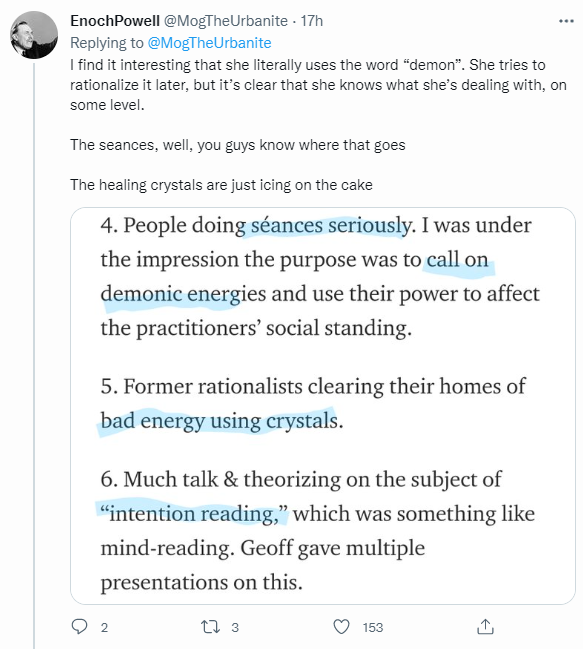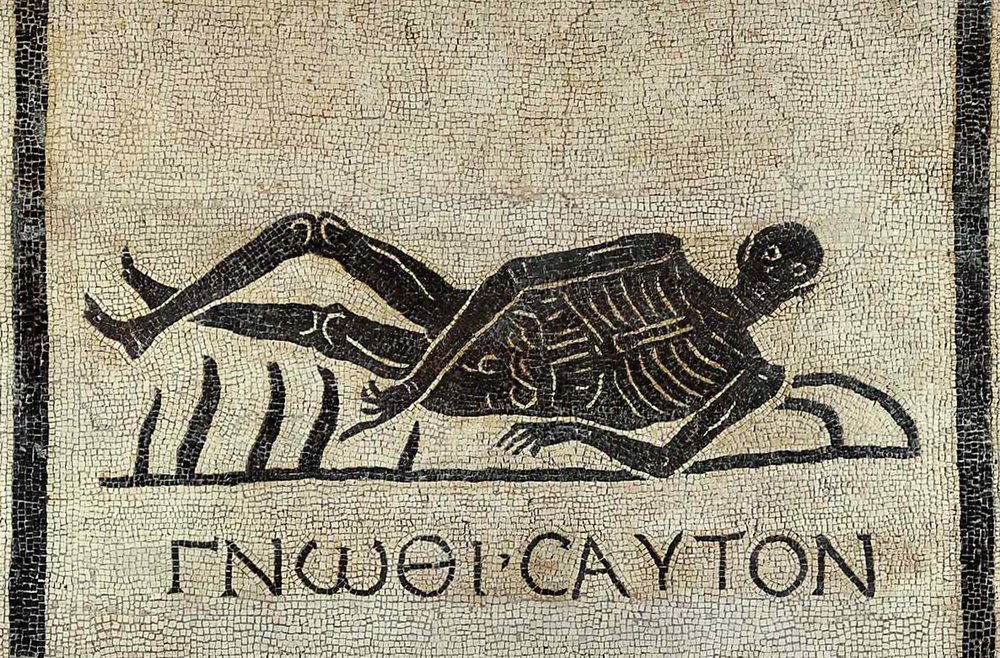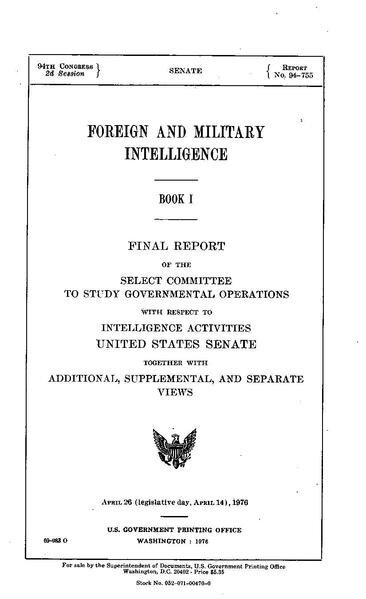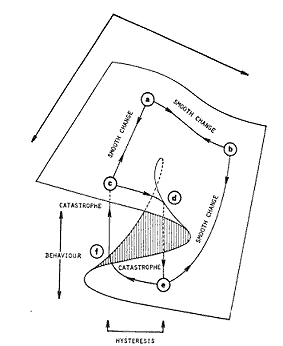A cautionary tale
In the 2022-07-15 Linkfest I linked to a pair of articles detailing rationalist cults:
These are well worth reading, as they expose something that is more common than you might think. All of this should have been predictable, but the history of the phenomenon is not well-appreciated.

These articles just happen to hit at the perfect time to allow me to bring all of my hobbies and interests together. Bear with me, this is going to be good.
It was my review of Dune: Messiah that really made it all click together. The paperback editions I have been reading have excellent supplementary material written by Brian Herbert, Frank’s son who wrote a number of additional works in his father’s universe while carefully preserving his father’s legacy in the wider world. However, I do think that Brian unduly focuses on his father’s criticism of cults of personality in politics, and misses Frank’s criticism of cults of personality in other places.
One of those places, one that Frank would have known very well, is science fiction itself.
And not just a cult of personality in the sense of following a charismatic leader, but cults that specifically attempted to practice very applied psychology in the pursuit of a kind of transcendence. Something I noticed in Messiah, but didn’t quite fit into my review, is the many practitioners of arts of personal perfection, like the prana-bindu of the Bene Gesserit, are far more emotional and manipulatable than they should be. If their arts genuinely worked as advertised, things should have gone differently.
I conclude that Frank wanted to criticize this movement in both science fiction and the wider world by showing that their methods didn’t work. But what movement, and what methods did Frank Herbert want to criticize? In their self-perception, they are “loose coalitions of wise and far-sighted men who act for the betterment of all mankind“. Their methods are self-cultivation through a variety of techniques of self-understanding, trying to operationalize the Greek maxim “know thyself”.

"KNOW THYSELF" (GREEK: ΓΝΩ͂ΘΙ ΣΕΑΥΤΌΝ)
In the science fiction world, one of the biggest names was Alfred Korzybski, the creator of a theory called General Semantics. I like the Wikipedia summary of General Semantics:
Korzybski maintained that humans are limited in what they know by (1) the structure of their nervous systems, and (2) the structure of their languages. Humans cannot experience the world directly, but only through their "abstractions" (nonverbal impressions or "gleanings" derived from the nervous system, and verbal indicators expressed and derived from language).
This is pretty much exactly the philosophy of the Bene Gesserit in Dune, the content accurately captured in the hostile review I quoted in my review of Messiah, but not, in my opinion, understanding that Frank meant to make it clear these were all bad things that brought about tragedy in his story:
Agnosticism is reflected in the modernist idea that spiritual truth is beyond the capacity of human knowledge to comprehend and human words to express. In this view, all human religions are equal, in that they are imperfect attempts made by humans to commune with God.
…
…their principal doctrine, namely, evolution. To the laws of evolution everything is subject under penalty of death—dogma, Church, worship, the Books we revere as sacred, even faith itself.
…
The third aspect of modernism Pius X identified is “vital immanence,” which may be simply termed subjectivism. This idea, derived from the philosophies of Hegel and Kant and the 20th century philosophy of existentialism, is that human beings are trapped within their own minds and cannot truly know reality, except as mediated by their own individual perceptions.
General semantics and associated ideas were quite fashionable among John W. Campbell and the well-known authors who wrote the kind of story that defined the newly coined “science fiction” in the late thirties and early forties. But there is an interesting tension here.
The men who created science fiction where materialists of the strict observance. The ideas of Korzybski can be scientific, but they can also shade off into mystical woo. Much of what you see in the self-help and alternative spirituality sections at the bookstore is a intellectual descendant of General Semantics. We don’t have to imagine how this would have driven John B. Michel and other convinced materialists crazy. The Futurians who coalesced around Michel and who also functioned as the gatekeepers of science fiction did their best to cast out anyone who was associated with these ideas.
A.E. Van Vogt was one of their victims in the early forties. Van Vogt was influential in Hubbard’s Dianetics, another offshoot of Korzybski’s work. Hilariously, Van Vogt didn’t want to be involved with Scientology because of its “mysticism”, giving us a clue to how in the 2010s a group of people who call themselves “rationalists”, meaning materialist atheists, can get involved with seances and summoning demons. They are the “spiritual but not religious” of their movement, too lazy or undiscerning to make fine distinctions. For Van Vogt, Scientology but not Dianetics was one step too far. For any kind of real materialist, all of it was too far.
I like to imagine the reaction of a late 1990s or early 2000s New Atheist to the things that were going on at Leverage. I have a hard time imagining Richard Dawkins seeing it as anything but unbelievably stupid. It was unbelievably stupid. I can respect that kind of grumpy integrity.
As an aside, this is where psionics comes from in D&D. Dungeons and Dragons is intended to allow players to experience stories like in the popular adventure literature of the twentieth century, and under Campbell’s influence, psionics was big for a while. The spiritual but not materialist types saw psionics as scientific, and therefore not magic, which is why psionics is not magic in D&D. This all seemed baffling to the Futurians; psionics was just as mystical as religion to them. It seems baffling to us too, but for a different reason. Now, psionics seem to obviously just another kind of magic, because materialism as a real professed philosophy has evaporated as the world has re-enchanted. This is obviously true even among all but a small minority of people who call themselves rationalists.
The absolute hubris of the cult at Leverage comes straight out of Korzybski. Korzybski after all named his work general semantics, as if it were the culmination of all of philosophy up till that point. Let’s examine the reports to see what I mean:
For example, it wasn’t uncommon to hear “Connection Theory is the One True Theory of Psychology,” “Geoff is the best philosopher who has ever lived” “Geoff is maybe the only mind who has ever existed who is capable of saving the world” or “Geoff’s theoretical process is world-historical.”
Some examples:
— Within a few months of joining, a supervisor I trusted who had recruited me confided in me privately, “I think there’s good reason to believe Geoff is the best philosopher who’s ever lived, better than Kant. I think his existence on earth right now is an historical event.”
— Another supervisor spoke wonderingly about Geoff’s presence in our lives, “It’s hard to make sense of the fact that this guy exists at all, and then on top of it, for some reason our lives have intersected with his, at this moment in history. It’s almost impossible to believe that we are the only people who have ever lived with access to the one actual theory of psychology.”
— Someone else in my group wrote an entire document outlining the history of psychology starting with the Greeks, going through Freud, Behaviorism and CBT, and ending with Geoff’s Connection Theory — the One True Theory of Psychology.
Reading the article, it is absolutely hilarious that the acolytes of Geoff Anders called him the best philosopher since Kant, while also obviously having no idea what Kant argued for or against. But a general ignorance is a common theme, because it is not at all clear that any of the lower level people at Leverage had any idea they were replicating a common script not only from the twentieth century, but from long long before as well.
Now there are non-nuts versions of this kind of thing. George Gurdjieff seems like a pretty good example of a guy who wanted to do this kind of thing but didn’t let it get out of hand. But we can go back even further. Take St. Teresa of Avila’s The Interior Castle.
I mention The Interior Castle because St. Teresa seems to have had a far better grasp of the real value, and the real dangers, of this kind of thing than most of the twentieth and twenty-first century practitioners that I know of. Confession and spiritual direction had similar functions for St. Theresa as the debugging practices of the Leverage cult, but were less destructive because they were embedded within the practices of the larger Church, and serve larger purposes.
We should note that nowhere does Teresa suggest that the contemplative path is necessary for salvation, or even peculiarly helpful for it. Neither does she make special claims for her model of the soul as a castle like a translucent crystal. Nonetheless, for those who found the analogy helpful, she suggested that those who wished to advance in the knowledge and experience of God could think of themselves as moving through a concentric system of six rings of rooms or mansions ("moradas") toward a seventh, central set, where God was most perfectly present. Each of these rings of mansions presented its own challenges in terms of personal reformation and the type of prayer that is possible there; also, in each successive ring God affects the seeker in a more dramatic and overwhelming way. After the inner sections, particularly after the Fourth Mansions, God is clearly controlling the advance, but grace of some kind is needed for every step, including the original decision to enter the Castle.
Outside the castle is a dark landscape, where poor sinners are preyed upon by "reptiles," which may be demons, or the temptations, or the sinners' own ill will. Entering on the spiritual life, the penitent comes to the First Mansions. There, with some suffering, he gains self-knowledge. This painful process is necessary, though these mansions are a relatively crepuscular region, where the assaults of the reptiles are still common. The Second Mansions are similarly dark and dangerous, but there the aspiring soul will first learn how to pray. In the Third Mansions there is less danger from the cruder assaults of evil. It is the region of ordinary virtue; continuance in a state of grace becomes easier. Though we are not told this explicitly, one might gather from the text that these are the Mansions where the faithful in secular life might ordinarily expect to spend their lives.
The kind of thing that St. Teresa is talking about in the contemplative prayer tradition is pretty clearly exactly the same kind of phenomenon you find in meditation, and also in these twentieth and twenty-first century self-perfection movements. It also clearly has the same dangers. Rather than a technique for producing uniquely integrated psyches, it seems to have a non-negligible risk of pushing sensitive souls into madness.
Another thing that strikes me as extremely funny about the Leverage cult was the goal to to use their techniques to become like Elon Musk:
At Leverage, we used mostly Leverage techniques for this (charting, belief reporting, self-alignment technique and a bunch of others that were developed). The overarching objective was to discover and “update” deep irrationalities and eventually become a sort of Musk-level super-person (“attain Mastery” of a world-saving-relevant domain).
The reason I find this funny is that Elon Musk also clearly doesn’t have a lack of deep irrationalities. Despite his very real technological and organizational achievements, Musk leaves an astonishing amount of human wreckage in his wake. This shouldn’t be surprising: people with tremendous accomplishments are often ridden by their obsessions, which just happen to work out well in some domain. The lack of psychological insight displayed by these supposed masters of The One True Theory of psychology is astonishing.
And of course, I haven’t even addressed the fundamental foolishness of dabbling in the occult simply because you lazily believe it doesn’t exist, that is is just some culturally conditioned expression of psychology. This too is part of the inheritance of science fiction. The thread of occult influence in science fiction can be seen in people like Jack Parsons, also in the social circles of the Campbellians. I haven’t yet plumbed the depths of these relationships, but that the relationships existed is plain to see.

Where it gets even crazier is that much of this stuff was taken deadly seriously in the Cold War. The really nutty things the intelligence agencies were exposed doing by the Church committee, things like farseeing and psychological manipulation through psychedelics, have common roots in this self-cultivation movement.
Frank Herbert didn’t have anything to say about the occult per se in the Dune books that I have read, but all the rest of it, including the use of psychedelics, comes in for a thorough drubbing.
Thus, we shouldn’t be surprised that the revival of these practices came to a bad end as well. Probably we are lucky that it hasn’t been worse. Perhaps the one saving grace of the Leverage group is that they were trying to save the world, although it is a well-known tendency of millennial cults to try to save the world by ending it.
Worse outcomes have already been imagined. Let’s try to keep them fictional.



Comments ()